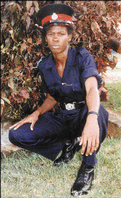By Avia Ustanny, Freelance Writer 
Karen Martin... I see this as a challenge. - Contributed
HOW ATTRACTIVE is the thought of spending your days serving, protecting and reassuring members of your community? It does not seem a hard thing to do, but many people shy away from joining the police Force. For women who are socialised to be risk averse, the decision may be very difficult.
For Corporal Karen Rosemarie Martin, however, there has been no hardship. She says she has enjoyed 11 rewarding years in the Jamaica Constabulary Force (JCF). When she entered the organisation 10 years ago it was not considered to be a dangerous career. And though times have changed, she still experiences no fear on the job.
"I always wanted to enter the Force. I wanted the experience," the 33-year-old woman told The Gleaner.
"I wanted to be a part of the organisation. It was either that or teaching because I love children too," she added.
She got her wish in March 1990, when she was called in for training at Cobbler Camp in Manchester. Her husband and mother were most supportive when crunch time came. They sent her off with good wishes.
In that recruiting year, there were 137 women trainees and only 37 men.
"Coming from a family of four, it was a shock to have to live with nearly 200 people for eight months. The most challenging part of the training programme was the assault course and the use of firearms. Going over the hills and valleys of Cobbler through sun and rain," she recalls. But in the end, it was rewarding. They became new creatures. Graduation was on October 12, 1990.
Corporal Martin was posted at Kingston Central where she spent one week, and then went off to Fletcher's Land -- a vibrant inner-city community still in the capital city.
It was not the baptism of fire one would expect.
At Fletcher's Land, she said, "there were senior men who helped me. I was only the third female to go there. The residents, the people came to me and discussed their problems. I helped them when I could.
"I got a little girl, aged nine, who used to run away. I am still working with her. I still have a relationship with the area."
She was at Fletcher's Land until May 1992 when she was transferred to the circuit court for one year. In 1993 she was transferred to the Mounted Troops. "I was one of the first females in that division. Spent hours patrolling the Beverley Hills, Mona, New Kingston and other areas of Kingston, St. Andrew. It was exciting."
Later, she was assigned to the Mobile Reserve and in 1999, she was promoted to the rank of corporal.
Today, Corporal Martin is experiencing another challenging phase of her career. On a temporary transfer to St. Catherine North Division, she now supervises probationers on the beat.
"I see this as a challenge. I am getting to know people and to groom and advise them."
The probationers and their supervisor have adopted children at Spanish Town schools , helping them with books and providing a listening ear for any problems they may have.
What's next? "I hope to become a commissioner. One must aim for the top at all times. The young corporal has several more rungs on the promotion ladder to climb. She must rise to through the posts of Sergeant, Inspector, Deputy Superintendent and Superintendent.
The Force is a good career option she advises, "... if one gets the calling for it."
Advantages, apart form the opportunity to serve, include opportunities for continuous education.
Those interested in becoming members of the police force must pass a written examination and an interview. Ordinary level subjects are an advantage. After a medical examination is done, successful interviewees are called in for training.
Promotion comes with points gained for service, performance and the successful completion of examinations at each level.



























